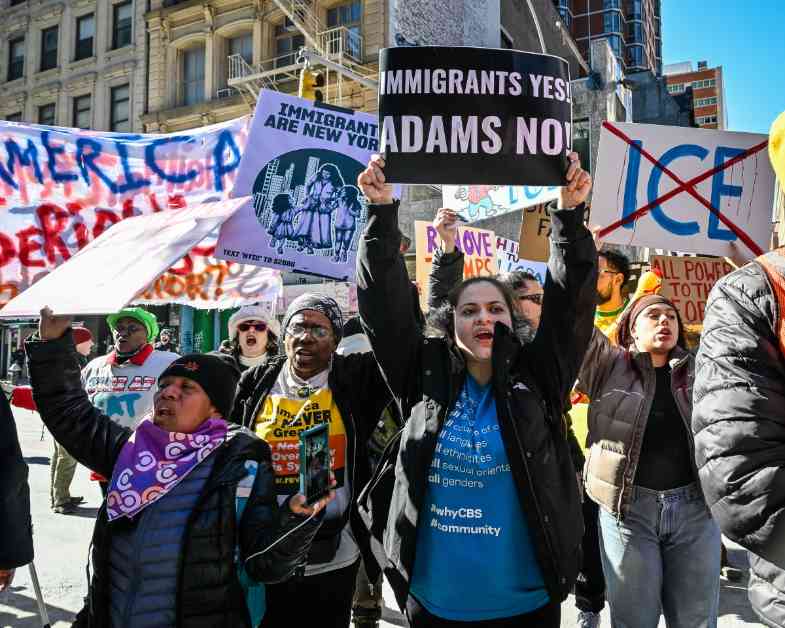In the heart of Lower Manhattan, the spirit of activism and civic engagement was alive and well as New Yorkers gathered on a chilly February day to make their voices heard. The focal point of their fervor? A demand for Governor Kathy Hochul to take decisive action and remove Mayor Eric Adams from office. This rally, organized by the New York Immigration Coalition, drew hundreds of impassioned individuals who felt a deep sense of urgency in addressing the alleged transgressions of the city’s leader.
The backdrop for this gathering was set just two days after Governor Hochul’s announcement that she would not exercise her executive authority to oust Mayor Adams, opting instead to impose restrictions on his powers. This decision left many feeling unsatisfied and concerned, prompting them to take to the streets in protest. The palpable sense of frustration and disillusionment was evident as the crowd assembled in Washington Square Park before embarking on a march to City Hall, their voices echoing through the canyons of the city’s streets.
At the heart of the matter was the assertion made by former US Attorney Danielle Sassoon, who alleged that Mayor Adams had engaged in a quid pro quo arrangement with the Trump administration. This alleged deal, offering cooperation with Trump’s immigration policies in exchange for legal reprieve, cast a shadow of doubt over Adams’ leadership. Despite vehement denials from Adams and his legal team, the specter of corruption loomed large, fueling the calls for his removal.
The sentiment among rally participants was one of urgency and disbelief that their elected official could be entangled in such scandalous allegations. Murad Awawdeh, President and CEO of the NYIC, encapsulated the prevailing mood when he expressed concern over the impact of Adams’ actions on immigrant communities. The fear and uncertainty felt by these groups were underscored by Awawdeh’s poignant anecdotes of disrupted daily lives, from missed medical appointments to children staying home from school.
The rally served as a platform for a diverse array of speakers to address the crowd, each one adding their voice to the growing chorus of dissent. City Council Member Alexa Avilés and Democratic State Senator Kristen Gonzalez both echoed the sentiment that Mayor Adams’ actions were antithetical to the values of inclusivity and progress that the city stood for. Avilés, in particular, highlighted the financial toll of Adams’ policies on immigrant communities, painting a vivid picture of the human cost of political expediency.
Julio Herrera, representing the Black Institute and Black Leadership Action Coalition, pulled no punches in his assessment of Adams’ tenure as mayor. Describing him as a liability and a detriment to the city, Herrera’s impassioned plea for Governor Hochul to take decisive action struck a chord with the crowd. His stark warnings about the consequences of inaction underscored the gravity of the situation, painting a stark contrast between political posturing and real-world consequences.
As the protest unfolded and voices rose in unison, the urgency of the moment was palpable. The fate of Mayor Eric Adams hung in the balance, his leadership under intense scrutiny and his future uncertain. The rallying cry for accountability and integrity reverberated through the streets of Lower Manhattan, a testament to the power of grassroots activism and the unwavering spirit of New Yorkers determined to hold their leaders accountable.

